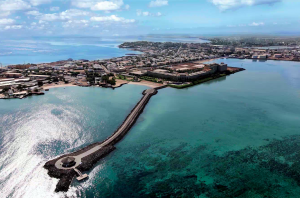A small and little known country in the Horn of Africa, south of Eritrea and north of Somalia, Djibouti is a land of natural treasures. There are plateaus and plains along the foothills of volcanoes, even a couple of protected forests, where you can see wildlife such as gazelles, monkeys, an enormous variety of birds, and this is also where you can see nomadic people grazing their goats and camels along the edges of lakes. Not much lives in Lake Assal though, since it is a salt lake and the second lowest land depression on Earth. The scenery around the world are breathtaking, so much so that this is a UNESCO World Heritage Site. Tadjoura is one of the oldest towns in East Africa and lies on the Gulf of Tadjoura – known as one of the best places in the world to snorkel and dive with whale sharks. Djibouti City is the hub of the country and is a melting pot of culture. Here you can enjoy creature comforts and explore a city in grand transformation.

The port of Djibouti City
The country has a reputation as being one of the most stable in the region, and it’s eco-attractions have not gone unnoticed. In 2018 Djibouti City became the first African city to be named the World Capital of Culture and Tourism by the European Council on Tourism and Trade, and the country has begun to win accolades by travel influencers such as Lonely Planet. The government of Djibouti has an ambitious plan to quadruple tourist numbers by 2030. The tourist sector accounts for 3% of GDP yet in 2105 it was estimated that there were on 4,500 local people employed directly in tourism, mostly servicing the alternative French travel sector.
In 2020, all thoughts of growth had to be shelved due to the arrival of COVID. Djibouti is the home to several military bases of some of the world’s superpowers, and it was through these bases that COVID first arrived in March 2020 – from Spain and the USA. The situation developed rapidl;y and by April, Djibouti had the highest outbreak in Africa, leading to emergency funding from the World Bank and the provision of medical equipment by the WHO. This was despite the government suspending all commercial flights on 18 March, closing schools and places of worship, and moving the country in to lockdown until May 2020, when measures wer slowly relaxed in stages. As cases dropped even further, flights to and from the international airport resumed on 18 July 2020.
Currently there are no curfews in place, no restrictions on interstate travel, but upon arrival at Ambouli International Airport all passengers are tested for COVID using a minimally invasive saliva test. Furthermore, when leaving Djibouti, you must provide evidence of a negative test to airport authorities. More information can be found here: UK GOV – entry requirements![]() .
.
To date, Djibouti has reocrded over 13,000 cases and just 180 deaths. It is ranked at 140 in the list of countries with the highest death rate per capita – very low. It has suffered small spikes in May/June 2020, April/May 2021, and October 2021. An analysis of excess deaths indicates that deaths may have been underreported by 1.5 times (143%), but this would still mean a low real death rate. In March 2021, Djibouti became the second country in the Middle Eats and North Africa to receive vaccines, yet to date only 2.6% of the population has been fully vaccinated.
Our Djibouti liveaboard cruises are set to resume in December 2021 and run until February 2022. The safaris explore the Seven Brothers archipelago, a region of untouched coral reefs, amazing drop offs and shipwrecks, where you can dive with large schools of fish, dolphins and manta rays. You will also visit the Gulf of Tadjoura or Goubet, a coastal region of Djibouti, famed for superb whale shark snorkelling encounters.
Djibouti is served by flights with Emirates, Qatar Airways, Air Djibouti, Air France, Ethiopian Airlines, Turkish Airlines, Fly Dubai and Kenya Airways. We hope you get the chance to travel to and enjoy this remote corner of Africa very soon.